Weston Cutter's Blog, page 29
August 3, 2011
Hot Damn
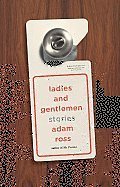 Unfortunately, I didn't (despite the buzz) read Adam Ross's Mr Peanut on its release last year, which meant that when I got a copy of his collection, Ladies and Gentlemen, I didn't tackle it with the haste and hunger it deserved. Let my mistake serve you: read Mr. Ross's books as soon as you possibly can—I can't personally recommend Mr Peanut, but it's damn near impossible to imagine, after reading the stories, that Ross's novel can be anything other than fantastic.
Unfortunately, I didn't (despite the buzz) read Adam Ross's Mr Peanut on its release last year, which meant that when I got a copy of his collection, Ladies and Gentlemen, I didn't tackle it with the haste and hunger it deserved. Let my mistake serve you: read Mr. Ross's books as soon as you possibly can—I can't personally recommend Mr Peanut, but it's damn near impossible to imagine, after reading the stories, that Ross's novel can be anything other than fantastic.
Here's what happened: I picked up Ladies and Gentlemen and flipped to the collection's middle story (there are seven)—"In the Basement." The story is a lot of things: the characters are deeply real, jumping from the page faster than you can believe (and, to Ross's credit, the characters's realities seem effortlessly created: nothing's better than reading someone who makes it look easy [there's a whole long digression available here about how great Ross is at these moves. The way this stuff shakes out for me ends up being about good background detail, good ancillary/periphal stuff that makes the rest of the story feel more real; tossed-off detail that doesn't *matter* to the narrative at hand, but which, if solid enough, enriches the story tremendously...think, maybe, of the difference between eating a tremendous meal in a shit hole restaurant with people screaming all around you vs eating it in your favorite conceivable spot]), and it's compellingly dark, but not too much so (if the majority of Carver's stuff's like 10 out of 10 on the dark scale, with 1 being blinding sunlight and 10 being the creepy shadow-on-shadow of industrial plants at night in bad areas of town, Ross's stuff's like 6-7, mostly), and it's ambiguous in generative ways, and it's just gorgeously, massively well-written (I just finished a novel that I'll be reviewing elsewhere this fall and the book, fundamentally, didn't work for me—the characters were never really likable, and there were large digression on abstractions which weren't compelling and felt like they were there exclusively to impress or lend a serious air to proceedings—but it is so well written: there were times I'd feel myself frustrated by the various aspects that seemed to be pushing me away from giving a shit, but then the writing itself would gain traction and I'd continue. It brought up this whole idea of compelling writing vs compelling idea, and the balance the best fiction demands [and sets up an odd metric, I think, for readers: if the idea's a 10 out of 10 and the writing's just a 6, I'd say keep going, and ditto if the numbers were transposed, but what about a 7/7? Is that enough? This isn't just rhetorical or theoretical: had I not been reading the book to review it, I'd've set it aside]).
Note Carver, too: "In the Basement" takes the form of the classic old Carver mold, two couples hanging out, friction staticky in the air, a long story told from one to the other couple, undercurrents swirling and sensed-at if not overtly articulated. Ross does this stuff perfectly, though his stories almost always feature wealth and its interstices in places of Carver's blue-collar humpers.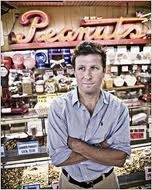
Anyway, I read that story first, and left the collection to the side for a week or two, and then came back, picked up where I left off, and was just knocked on my ass by "When in Rome," a story of brothers and regret and not connecting and all the good heavy-duty stuff one comes to fiction to receive. After "When in Rome," I took the rest of the book in a night. It's hard to overstate how good the book is: these are real characters in here, folks prone to the same delights and delusions and self-evasion we all have to confront, in ourselves and those we bother allowing proximity to our real wants, daily. The book is, yes, on the darker side of things, but not out of anything that feels like mercilessness: from the woman considering some maritally-destructive moves in the title story to the sophomore (=wise fool) in "The Suidice Room" who, in one night, discovers that defining moments, contrary to what one of the characters claims, aren't chosen, but are things which happen to us, the characters in these great stories are being tested (or are choosing to test themselves), which testing, given that this is life, almost always involved having to look closely at things one might otherwise wish to ignore or, at least, not pay exceptionally pointilistically-sharp attention to.
All this theoricizing is just empty flailing, of course: Ladies and Gentlemen stuns and works wonders and I absolutely dare any reader to dip into it and not just tear through the thing in one night. Warn your spouse or bedmate before you begin the thing, though: the night'll be longer than you think.








July 29, 2011
The kids aren't alright: a review of Ben Dolnick's "You Know Who You Are."
So. If you've been following along, then you know that I've been teasing out a kind of pre-thirty quarter-life crisis by reviewing a bunch of books featuring adolescent protagnists.








July 16, 2011
Real Quick
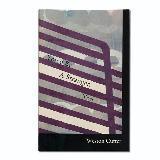 I'm blogging for the next while at the Kenyon Review Blog, and I've had a couple things over there recently, hence Corduroy being a bit quieter than it should otherwise be. Like everyone, as ever: I keep hoping more time just magically presents itself.
I'm blogging for the next while at the Kenyon Review Blog, and I've had a couple things over there recently, hence Corduroy being a bit quieter than it should otherwise be. Like everyone, as ever: I keep hoping more time just magically presents itself.
Here's a review I've been waiting for for awhile–my book's been reviewed in the Star Tribune. A note, too: authors actually don't mind reviews that point out the bad crap in the book, especially when it's bad copy editing. I've been waiting for a review to point out the mistakes for awhile–nice to just see it out there.
Also, just because it's fascinating (I think): Blake Butler posted, on HTMLGiant, the list of everywhere he submitted to in 2006-08. For unclear reasons I'm hugely hit by seeing it.








July 12, 2011
Whoaaaaaa, man!
I've been trying to read more books by women authors lately. It's not that I've ever intentionally gone out of my way to avoid them, but when I look at all the books in my apartment, I'm a little disturbed by how overwhelmingly male the authors are. Lucky for me there's a shitload of new books out by some amazing women authors. Here are some of the latest I've checked out:
In Zanesville by Jo Anne Beard
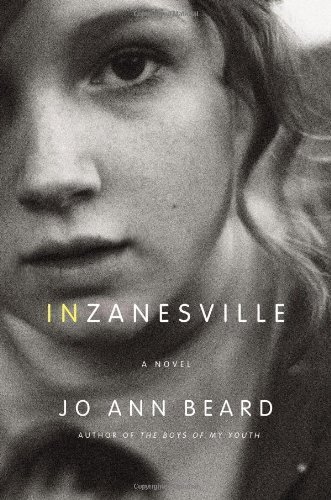 I'll shoot straight with you: I wanted to like this more than I did. It's not that the prose is bad; it's actually quite good–pointed, concise, and well within keeping of the idea of a fourteen-year-old narrator. And it wasn't that the characters were bad, either; again, quite the opposite: they were painfully real, as was the friendship between our narrator–who goes unnamed, for some reason–and her best friend Felicia (Flea). What troubled me was that this relationship was pretty much the entire story. And while I have no doubt that it's possible to pull this off, there wasn't much to unify the girls' many misadventures. Rather, Beard s jumps from scene to scene without any larger objective in mind, making it difficult for the reader to settle into the story.
I'll shoot straight with you: I wanted to like this more than I did. It's not that the prose is bad; it's actually quite good–pointed, concise, and well within keeping of the idea of a fourteen-year-old narrator. And it wasn't that the characters were bad, either; again, quite the opposite: they were painfully real, as was the friendship between our narrator–who goes unnamed, for some reason–and her best friend Felicia (Flea). What troubled me was that this relationship was pretty much the entire story. And while I have no doubt that it's possible to pull this off, there wasn't much to unify the girls' many misadventures. Rather, Beard s jumps from scene to scene without any larger objective in mind, making it difficult for the reader to settle into the story.
We begin the story with a babysitting gig gone terribly wrong, and then immediately abandon that in favor of something else entirely, and then something else, on and on with very little narrative thread to keep us anchored. As for conflict, it's there, but it doesn't really rear its head until halfway through the book (though when it does, it's good reading).
Still, there are some very colorful characters here and some very compelling scenes, particularly when the element of boys is introduced into the girls' insular little world. And at the end of the day, that's sort of all we really want from a story. Most of us, at least. Still, if only Beard could have gone a step further in demonstrating to us how we as readers fit into that little world.
The Adults by Allison Espach
For most men, our simultaneous bafflement of and amazement with women starts around adolescence (I guess this would be the case for most women too, though I find it best not to speak on behalf of the fairer sex because that usually gets me into trouble): all of sudden these people you've been around your entire life take on a peculiar air of mystery, and then of course as we all know, we spend pretty much all of high school trying desperately just to be simultaneously noticed and overlooked.
The fact is, men never really outgrow this sense of high school confusion. We like to think we do, and some of us do a good job of pretending like we have (e.g. political pundits, the cast of Jersey Shore), but we're always lugging around some inkling of self-consciousness from that period in our lives, some vestigal sense of wonder/fear over women.
And so, strange as it may sound, maybe this is why I'm drawn to books with teenage female protagonists, because I've never really[image error] gotten over my belief that they are the most bizarre creatures on earth. They are about the exact opposite of me–and guys like me–in almost every way. Which makes them interesting in a literary sense. Allison Espach seems to understand this. Or at least Emily Vidal, the narrator in The Adults, does. Like our unnamed main character in In Zanesville, Emily is mired in that viscious state of teenage awkwardness; she is both fascinated and repulsed by her very existence. And like our Zanesville narrator, Emily is desperately seeking out people to love her–her catty girlfriends, her depressive mother and filandering father, and most notably her freshman English teacher Mr. Basketball, with whom she carries on a tumultuous relationship for years to come.
But The Adults differs in the degree of introspection that our characters are permitted. Emily looks at even the most inocuous events in her life as potentially revelatory, a trait that is manifest largely in the keen musicality of the prose.
Admittedly, the story does come close to being longwinded; this has a lot to do with the years' long back-and-forth between Emily and Mr. Basketball which, by the time she has entered grad school, begins to lose its risque' charm. Still, even with this, what you've got here is one of the most eloquent coming-of-age tales to be released over the past few years. Espach demonstrates, with striking accuracy, that while our problems may change as we get older, the feelings they engender in us never really do. At least, not in the way you would hope when you're fifteen.








July 7, 2011
Quick, Go Here
 The new Sixth Finch is up and stuns over and over (and sure, I've got some stuff in it, but I'm much more interested in/impressed by the other work therein–M Lippman, E Skoog, someone named Leora Fridman who I hadn't known before but now do and please, please: don't take as long to get to know her as I have. Go read.
The new Sixth Finch is up and stuns over and over (and sure, I've got some stuff in it, but I'm much more interested in/impressed by the other work therein–M Lippman, E Skoog, someone named Leora Fridman who I hadn't known before but now do and please, please: don't take as long to get to know her as I have. Go read.








July 4, 2011
Teenagers from Mars! A Review of Peter Bognanni's "The House of Tomorrow."
 I've been on this kick lately about books about teenage protagonists. I'm not sure why. Maybe I'm just getting old and I'm trying to salvage some shred of my adolescence. Maybe I'm just a few steps away from getting my ear pierced and buying a Corvette.
I've been on this kick lately about books about teenage protagonists. I'm not sure why. Maybe I'm just getting old and I'm trying to salvage some shred of my adolescence. Maybe I'm just a few steps away from getting my ear pierced and buying a Corvette.
Or maybe it's because it dawned on me recently that the best books I've ever read have featured teenage protagonists and I've been trying to recapture the magic of those reads. I mean, look: say what you want, but Holden Caulfield is one of the best damn narrators in the history of the written language.
This was what led me to Peter Bognanni's The House of Tomorrow; it appealled to the pissy sixteen-year-old in me. That's probably also because it is in about pissy sixteen-year-olds.
At first, the premise sounds like the stuff of hokey Disney movies: our 16-year-old protagonist Sebastian Pendergast is cast out of the lonely geodesic dome in which he was raised in near-seclusion by his eccentric grandmother and is taken in by the comically dysfunctional Whitcombs–Janice, Meredith, and Jared. Jared, also 16, is the recent recipient of a heart transplant and is determined to find out just how much his weakened body can handle. He and Sebastian develop a peculiar friendship and end up forming a punk band in hopes of playing at the family's church's talent show.
To be sure, this is fairly well-tread territory. Sebastian's relationship with Jared is reminiscient of Chief Broom's relationship with Randall McMurphy in One Flew Over the Cuckoo's Nest: both of the latter are guileless, shy, quiet, drawn to the opposing characters for their recklessness, their never-ending quest(s) to buck the system. In Jared's case, the system is his mother Janice, who smothers him with her concern for his health, and his sister Meredith and her not-so-secret nightlife.
And yet, well-tread or no, the story still feels fresh and honest. Bognanni sketches his characters almost exclusively through action and dialogue. The most successful of them is Jared, who is portrayed in large part through his interactions with Sebastian:
"Jared," I said. "Why do you have to talk to me like this?"
"I think we should start a band," he said.
"What?"
As usual, he had slipped the most important words into a tiny space.
"Okay," he said, "okay. I know I'm taking a giant fucking risk here. I'm going to have to teach you everything, and you're obviously going to do it all wrong. But I'm not looking for a Sid Vicious, you know. I just need somebody to do what I say. Not somebody with a real personality. I get to have the ideas. Don't argue."
I tried to wade through his babble, but it was that first question that lingered.
"I don't know how to be in a band," I said.
"You don't know anything. You probably can't pee by yourself. But I'm going to mold you. That's the whole idea. I'm the front man. You'll play bass."
Tying all of the narrative threads together is Jared's love of and Sebastian's discovery of the Misfits. A lot of authors have difficulty invoking real-life elements like bands or movies into their work without descending into some masturbatory celebration of their own hipness (I know this because I do it). But what makes it work in the case of this book is the characters' complete musical naivety. Jared isn't so much an afficionado of the genre as he is an angsty teen who's gotten his hands on a couple noteworthy albums and, as a consequence, has determined that it is his destiny to front a punk band. Nevermind the fact that neither boy knows how to play an instrument (Bognanni's depictions of their songwriting sessions are superb in this regard), or that they don't have a drummer, or that neither of them has ever performed in his life. All Jared wants is to stand on a stage with his guitar and howl into a microphone and be loved for it. And if you've ever been a sixteen-year-old dude from a white suburb, chances are you've had this exact dream.
invoking real-life elements like bands or movies into their work without descending into some masturbatory celebration of their own hipness (I know this because I do it). But what makes it work in the case of this book is the characters' complete musical naivety. Jared isn't so much an afficionado of the genre as he is an angsty teen who's gotten his hands on a couple noteworthy albums and, as a consequence, has determined that it is his destiny to front a punk band. Nevermind the fact that neither boy knows how to play an instrument (Bognanni's depictions of their songwriting sessions are superb in this regard), or that they don't have a drummer, or that neither of them has ever performed in his life. All Jared wants is to stand on a stage with his guitar and howl into a microphone and be loved for it. And if you've ever been a sixteen-year-old dude from a white suburb, chances are you've had this exact dream.
The House of Tomorrow is compelling because those elements that, theoretically at least, should be the most enticing–Sebastian's geodesic dome house, his grandmother's fixation with a long-dead scientist/philosopher–actually take a backseat to the characters. And to me, this has always been the sign of a good story. We're oddly fascinated by the Whitcombs, by what lies beneath their wholesome, god-fearing veneer, and by how it contributes to Sebastian's transformation from an introverted egghead to a booze-swilling punk rocker.








June 28, 2011
The Future's Power
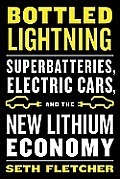 Bottled Lightning
by Seth Fletcher
Bottled Lightning
by Seth Fletcher
Last year's Herding Donkeysis the book that the experience of reading this book came closest to: a book I cracked, sat on the couch thinking casually this'll do for now then found myself hours later still riveted, unable to focus on much else. Herding Donkeys was of course a fantastic, brisk and informative tracking of the rise of the democratic party starting with the lead-up to the election in '04 (earlier, to a degree, but mainly, think Dean); Bottled Lightning's a fantastic, brisk and informative dual tracking of both 1) the use of electricity to power an automobile and 2) the present and potential future of lithium ion batteries. Aside from the little info nuggets you'll pocket in reading the book (first big industrial investor in Lithium batteries? Oil companies. Present soft drink which originated as a lithiated beverage? 7-Up), the most useful thing Bottled Lightning will offer any reader is something like a framework for understanding out present energy moment, how we got here, and what might come next.
First: fear not, this book is not polemical, is no tirade. Fletcher's not out to demonize anyone. I'm sure global warming comes up in the book, but I honestly can't remember it, which is just to say that Bottled Lightning will (hopefully) help reframe the socio-political connections a reader might make between, say, a Prius driver and that person's propensity to vote in certain ways (if Nocera, the fracking apologist, can so glowingly write about liking the Volt, there's hope for us all). Sure: the reader needs to bring a decent amount of knowledge and info to the reading table to fully appreciate how significant it is for the future of the US's middle class that there be easy transportation (seemingly, specifically, automotive transportation [/shakes head sadly about the lack of infrastructure funding for trains/]); still, just the info and technological background on batteries and the development of lithium ion is riveting enough.
Enough about the more political aspects: what's massively cool about Bottled Lightning is the depth Fletcher offers about the development of modern batteries. It seems to me relatively easy to overlook or not think much about the insanely rapid dwindling of cell phones (thanks, lithium!); it's also easy, at least for me, to forget that, along with the tech advances each year and iteration of whatever yr pocket-computer of your choosing, there are advances in batteries being made. Think about that for a second—better, think about that for a second after you've spent a full minute considering the fact that, aside from carbeuretors being replaced by fuel-injectors, there's been almost no change in the engines we use in our cars since the advent of cars. That fact alone should make everybody jump up and down about the potential for lithium ion batteries (I keep saying lithium ion, by the way, because just saying 'lithium' wouldn't be enough—there were generations of lithium batteries that existed, with different technology, before there were today's [or this decade's, really] lithium ion batteries, which history Fletcher traces with clarity and grace, which is saying something; you may not end up understanding every last detail of the science involved in these batteries, but you'll have, I'm guessing, a better grasp on it than you presently do).
Not least, Bottled Lightning does a quietly wonderful job of highlighting the fact that, should lithium end up being the essential component of our future's automotive (and otherwise) power needs, the middle east, yes, will suddenly prove less globally significant…but that doesn't remotely ensure geo-political stability (given that the largest supplies of lithium are in Bolivia and Chile, it's worth taking some time to consider how their politics might influence the global Li supply).
That might be a good way to talk about this book: it does, page after page, a quietly wonderful job of telling a riveting, vital story. You'll probably not read a more fundamentally useful book this year.








June 20, 2011
Ed Falco's "Burning Man"
We've made it pretty clear that we're huge fans of Ed Falco, both the man and his work. Most of us were fortunate enough to study [image error]under him at Virginia Tech, where he heads up the MFA program. Of course, this does make it a bit difficult to speak objectively about his writing; how do you know I'm telling the truth when I tell you that his most recent story collection, Burning Man, is easily the best story collection in his entire catalogue?
Well, frankly, you don't. So here's what you do: you go out, you buy a goddamn copy of the book, and you see for damn yourself.
Because the truth is that if you're familiar with Falco's stuff, then you know you're not taking any kind of risk; the author has been consistently praised for the way in which he employs violence as a means of characterization and not necessarily as a cog in some giant Stephen Kingy plot machine (case in point: Falco was contacted by Mario Puzo's estate to write a prequel to The Godfather; it will be out in 2012).
The characters in Burning Man are all bumbling through some complex set of circumstances that seems to worsen with every one of their attempts to escape it, and in this sense, they are painfully real. For instance, there's "Wild Girls," in which an art professor, a female acquaintance, and a former student make the impetuous decision to have a threesome, only to find that the stakes of such an endeavor are much higher and much more difficult to understand than they believed. Falco doesn't shy away from the taboo, but he doesn't fetishize it, either. Sex, violence, drugs–the author approaches these issues with the same thoughtfulness he uses when the most trivial of details of his characters' unique lives.
Like the protagonist in "Wild Girls," most of the main characters in this book are middle-aged men privately besieged by loneliness and the dim panic that tends to define the aging process. The most notable of these instances is the title story "Burning Man," in which a writer/academic attempts to reunite with his estranged brother at the annual Burning Man festival in Nevada's Black Rock Desert.
In terms of the prose itself, the book is a wonder. Not that this has ever been an issue for Falco, but whereas some of his earlier works favored concise Carveresque sentences, many of the stories in Burning Man resonate with a poetic flourish: the sentences are smooth and fluid, teasing the ideas out with a kind of steady grace reminiscent of such literary powerhouses as Phillip Roth and Johnathan Franzen.
 Many reviewers have already pointed out the book's "relationship"—if we're going to call it that—to the 9/11 attacks. The Nevada Review described it as (possibly) the first of its kind of post-9/11 books. This should come as no surprise considering that Falco is a native of Brooklyn and that tragic violence is a motif in many of his works. However, Falco always manages to explore this issue without all of that rubbernecky Grishamy sensationalism. Rather, his interest is the aftermath of the event, the grim internal struggles of those characters who must endure it. The events in "Among the Tootalonians" take place in New York a few years after the attacks, and while the characters maneuver through their lives with a sort of residual trepidation, Falco never explicitly references the attacks themselves.
Many reviewers have already pointed out the book's "relationship"—if we're going to call it that—to the 9/11 attacks. The Nevada Review described it as (possibly) the first of its kind of post-9/11 books. This should come as no surprise considering that Falco is a native of Brooklyn and that tragic violence is a motif in many of his works. However, Falco always manages to explore this issue without all of that rubbernecky Grishamy sensationalism. Rather, his interest is the aftermath of the event, the grim internal struggles of those characters who must endure it. The events in "Among the Tootalonians" take place in New York a few years after the attacks, and while the characters maneuver through their lives with a sort of residual trepidation, Falco never explicitly references the attacks themselves.
Why?
Because it's the characters that really matter here. Their wants. Their fears. The psychological forces that compel them into their curious predicaments. And no matter how grim those predicaments may be—whether we're watching two survivors of nightclub bombing play chess, or we're heading into the Nevada desert for one of the most infamous music festivals in the country—it is impossible not to follow these characters' every step.








June 16, 2011
New York ≠ Vivaldi (+parks)
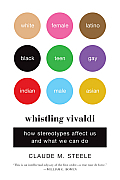 Whistling Vivaldi
by Claude M Steele
Whistling Vivaldi
by Claude M Steele
I'll admit up front to having a possibly outsized interest in stereotype threat—the telling details that are pegged to us because of demographics or appearance. It's weird how much this stuff arises, in strange ways all the time: every time you see someone on public transit reading a book it doesn't appear they 'should' be reading, by whatever metric you're using—that's stereotype threat.
I'm a white, bookish, four-eyed dude, and so seeing me with some inscrutable book of poetry or something's relatively easy—there's no psychic dissonance. Plant me at a classroom's front, though, and have me talk (without shame!) about being just riveted by this last season of the Bachelor, and things change…except only a little, because (and this is why I'm so interested in stereotype threat) my demographic gets away with just about anything re: stereotype threat as long as we can hide it behind irony (plus irony's relationship to sincerity grows stranger by the day). Plus no matter how tough I want to look, I'd be hard pressed to actually look like trouble: in my twenties, when I listened to nothing but rap, I was still emphatically a white dude driving a truck listening to rap. Hardly a threat.
However: Claude Steele's fantastic Whistling Vivaldi examines the negative pressures and weird trap-doors of stereotypic thinking we've mostly all got—the book's title's about a young black man who, on whistling classical music, neutralized the perceived threat he presented as to the white folks he walked by on sidewalks.
Let's not be muddled, either: this shit's awful—stereotype threats can be cutesy, to a degree (white dude talking about Brad and Emily), but more often than not they're destructive and constrictig in all sorts of terrible ways (I feel no compulsion to exclusively read the sorts of books a dude with my background and/or looks should read, but, even if I did, that'd hardly be a problem; now imagine if I was a 15 year old on the hockey team with an interest in dudes and the wonkiest depths of poli science). And of course all of this stuff's just righteously, desparetely twinned with ideas of identity—which, for all the freedom we've got re: identity, is still a damn scary arena, and one in which true transformation's as hard as taking a baseball bat to the ocean. All that said: Steele's Vivaldi is a riveting, great, eye- and mind-opening read, and you owe it to everyone you merely recognize instead of see to read this thing.
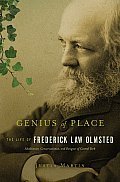 Genius of Place: the Life of Frederick Law Olmsted
by Justin Martin
Genius of Place: the Life of Frederick Law Olmsted
by Justin Martin
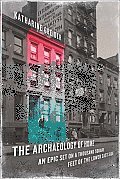
The Archeaology of Home by Katherine Greider
I'll admit a bit of interest in city planning and historical stuff about urban areas, and that may or may not have anything to do with the woman I'm married to. Regardless: books about cities do it for me in all sorts of ways (my interest, I'd like to disinterestedly claim, started long before I met the woman who's now my wife: I grew up in a big midwestern city, worked on a river for years on a boat that utilized century-old technology, and thrilled as a teenager to find old disused parts of the city which'd once been, we figured, sites of interest and drama and whatever…anyway).
Greider's The Archaeology of Home is a really great microhistory, sort of: instead of just being a history-of-this-one-thing (ingredient, writing implement, measuring device), it's more of a history-through-the-lens-of-this-one-thing (there's a critical difference, exceptionally fine though it may be), and the thing, in this case, is the building she lives in (a note from above: aside from growing up where I did and etc., my first apartment was in one of those great old off-Grand places in St. Paul—I dare anyone to live in such a place and sincerely not once wonder about what'd happened before in the same rooms or floors or buildings). Greider's a great guide, and in the course of her attempt to understand and see clearly the full history of her place on E 7th in Manhattan, she takes on the real big, heavy notions: home, belonging, roots, etc. It's great. Read the thing.
And if you don't know Olmsted, just know this: Central Park. Also know this: one of the lasting glories of downtown parks (designed by Olmsted or whomever) is that they provide access to big fancy abstractions (beauty, harmony, nature) to everybody, rich and poor, landed gentry and food-stampers. Take that for granted such obviousness if you wish, but know that such an idea was radical as recently as 150 years ago (is still, lots of us'd argue, plenty radical), and also know that Olmsted was one of the people behind making sure cities were functional meritocracies, not just playgrounds for the heaviest-pocketed. Of course there's huge ironic sorrow in the fact that his best-known park is, in fact, acres wide in the city that's become the playground for the heaviest-pocketed, but that's a different story: Genius of Place is a riveting and great intro to a fascinating architect not just of American places but American ideas.








June 13, 2011
Emily Aviation Fool
Here's an easy rule: pick at least five writers whose books you'll read no matter what, right when they come out. Balance the list, obviously—it can't all be hard-core nonfiction folks who do noodly academic stuff (Vendler, for those of us interested), and can't all be crunchy lit-fiction. But regardless, pick some writers. Good candidates, if you don't presently have a list: Jennifer Egan, Richard Powers, Elizabeth McCracken, Adrian Nicole LeBlanc, Lawrence Weschler…you get the idea.
Also: O'Nan. There may be no more reliable writer going at present—he's count-on-able as an old Big Ben alarm clock, and even if you're not overwhelmingly lit up by what he's doing (I was only so-so on his last, Songs for the Missing), you'll still find glory and beauty on every damn page. Emily, Alone, his latest, is gorgeous and makes some rich art of mundanity—in this case, in the later days of Emily Maxwell (apparently the protagonist ofWish You Were Here—Emily, Alone is a sequel, tho I didn't read the one that preceded it and didn't feel any deficit). Does it sound like a backhanded compliment to call this book quiet? Maybe that's not even a fair word: the book's almost ferociously grounded, relentlessly local (as some Local Newswriting students would have it)—you close the cover on this thing knowing Emily as well and dearly as you've known anyone on any page recently. If you're human, you'll recognize the awesome prospect of such an opportunity.
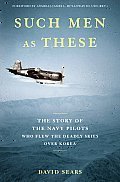 Such Men as These
by David Sears
Such Men as These
by David Sears
I'm not a fan of flying, and I'd be certain to pee myself if I were ever in a military jet, yet I was as into both of these books by Sears (Pacific Air just came out; Such Men hit a year ago but is coming now in paperback) as I was by the granddaddy of military flight books, The Right Stuff. I don't know how many of us'd wake up one day and think: You know? I really want to read about the imbalance of aviation power between Japan and the US in WWII. Or: I've always wondered about how the aviation behind the Korean war presaged Vietnam in certain ways. Fortunately, regardless of whether you've wondered after such things, Sears has, in these two great and compulsively readable books, offered answers. Grab them both, and then thank anyone you know who served, ever.
Ship of Fool
by William Trowbridge

Here's what's excellent: poetry that is both serious and funny. For instance, the start of "Fool Expelled From Eden":
OK, not the Eden, wasted on that pair
of gorgeous nitwits, but a pretty nice place
by Fool's lights, a little stucco number
tucked away in a little suburb bordered
by a mini-mall—just the spot to lever up
your dogs in the recliner and contemplate
the polka of the spheres,
There's plenty more—stucco, in the poem, ends up being water-permeable—but let's just focus quick on that moment in line five, that moment of someone "lever[ing] up / your dogs." Anybody who knows poetry knows that things come alive or stay inert in the details, that a poem can spin and soar to wild life on as little as the absence of an object, on an interesting phrasing of something otherwise obvious. Along with these aspects, poetry (at least as it's currently practiced, with voice mostly being the going currency [this is not a knock on Trowbridge—we all do this; what's the last poem you didn't like because of its structure? Subject, sure, that plays, but by and large subject's so closely tied together with voice it's hard to know beginnings and ends]) makes or breaks because of the voice of the speaker (or so I believe).
Trowbridge's Ship of Fool is a gorgeous, riveting, devouring read. It's also sneaky as all get out: much like a bag of very delicious snacky carbohydrates, you'll likely get into Ship of Fool and realize with a sort of shock awhile later that you're more than halfway through the collection—it's that sort of sneaky. Here's what's cool too: there's sometimes a weird math of poetry, at least with contemporary stuff, in which we're invited as readers to believe that if we don't work hard it's not serious or deep or whatever—and that argument's of course total bullshit, but sometimes it takes a poem like "Rented Tux" to have the thing properly dashed. Oh, and if you needed more: Fool is a recurring character in this book, is in poem after poem, and, like that dynamo Miss Peach in Rosemurgy's still-incredible The Stranger Manual, will keep you great and surprised company throughout.












